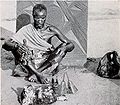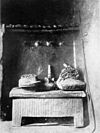Portal:Traditional African religions
Introduction The beliefs and practices of African people are highly diverse, and include various ethnic religions. Generally, these traditions are oral rather than scriptural and are passed down from one generation to another through narratives, songs, and festivals. They include beliefs in spirits and higher and lower gods, sometimes including a supreme being, as well as the veneration of the dead, use of magic, and traditional African medicine. Most religions can be described as animistic with various polytheistic and pantheistic aspects. The role of humanity is generally seen as one of harmonizing nature with the supernatural. (Full article...) Selected articleThe Ancient Egyptian religion was a complex system of polytheistic beliefs and rituals that formed an integral part of ancient Egyptian society. It centered on the Egyptians' interaction with many deities believed to be present in, and in control of, the world. Rituals such as prayer and offerings were provided to the gods to gain their favor. Formal religious practice centered on the pharaoh, the rulers of Egypt, believed to possess a divine power by virtue of their position. They acted as intermediaries between their people and the gods, and were obligated to sustain the gods through rituals and offerings so that they could maintain Ma'at, the order of the cosmos. The state dedicated enormous resources to Egyptian rituals and to the construction of the temples. Selected imagesFestivalsThere are several religious festivals found in the various Traditional African religions. Some of these are listed below next to their corresponding religion :
Selected biography
Cheikh Anta Diop (29 December 1923 – 7 February 1986) was a Senegalese historian, anthropologist, physicist, and politician who studied the human race's origins and pre-colonial African culture. Though Diop is sometimes referred to as an Afrocentrist, he predates the concept and thus was not himself an Afrocentric scholar. However, Diopian thought, as it is called, is paradigmatic to Afrocentricity. His work was greatly controversial and throughout his career, Diop argued that there was a shared cultural continuity across African peoples that was more important than the varied development of different ethnic groups shown by differences among languages and cultures over time.
Diop's work has posed important questions about the cultural bias inherent in scientific research. Cheikh Anta Diop University (formerly known as the University of Dakar), in Dakar, Senegal, is named after him. Selected quote
On the influence of African religion on art, Aloysius M. Lugira (2009), quoting Ladislas Segy (1975), Source: African Traditional Religion, Third Edition, 2009 by Aloysius M. Lugira, quoting Ladislas Segy, "African Sculpture Speak",Da Capo Press (1975), p. 118, ISBN 9780306800184
Did you know
Related portalsTopicsFor more Traditional African religion topics, see Category:Traditional African religions.
CategoriesWikiProjectsThings you can doAssociated WikimediaThe following Wikimedia Foundation sister projects provide more on this subject:
Discover Wikipedia using portals |






































